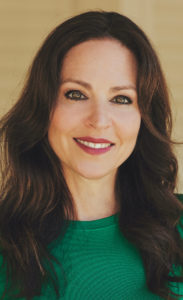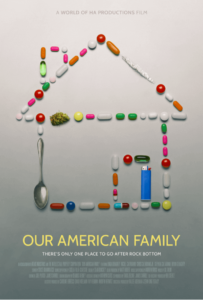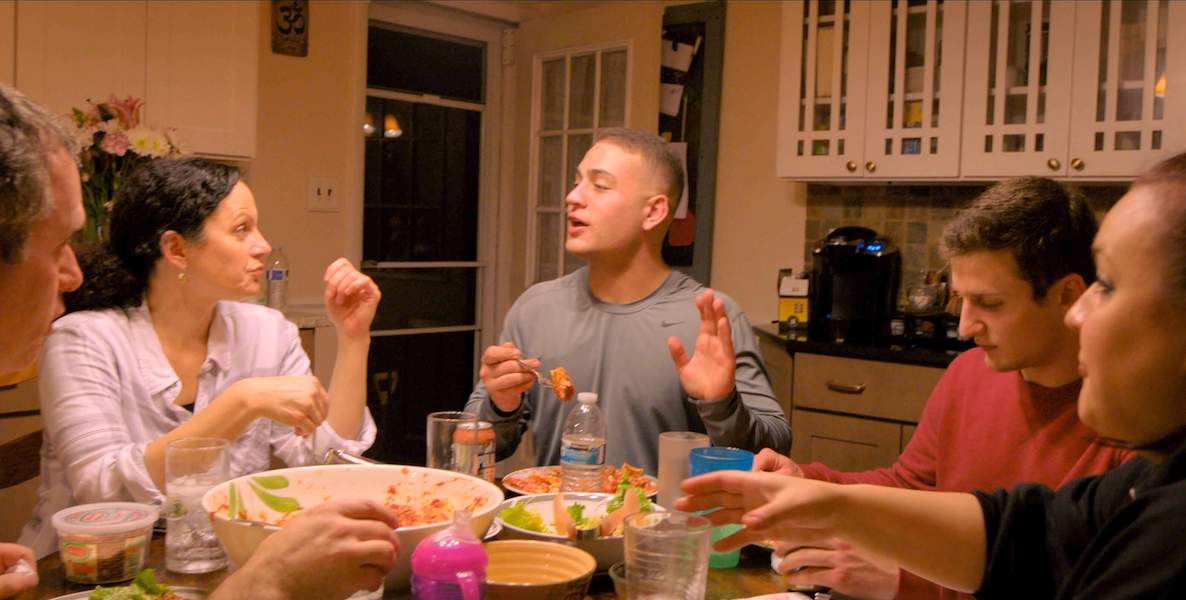There were more than 93,000 overdose deaths in the US in 2020—about 20,000 more than the year before. Here in Philly, there were 1,214 drug overdose fatalities last year. It’s hard to make sense of the true impact of this crisis that’s all around us—to understand the humans behind the numbers.
That’s what filmmaker and philanthropist Hallee Adelman set out to do with Our American Family, which she co-directed with director and producer Sean King O’Grady. The film intimately portrays one local family’s struggle with addiction—without experts, drug use or melodrama.
It makes clear how the disease perpetuates through generations—causing cycles of trauma and a stubborn impact on families. But it’s also a story of hope. That with strength and commitment to change, each generation can and will get healthier.
Over the course of one year, we get to know Nicole, who’s been in an out of treatment 17 times, challenged the patience of all the people who love her and is learning what it takes to stay sober; Linda (Nicole’s mom), who’s working to take care of her family while breaking the habit of enabling that she learned as the daughter of an addict; Bryan (Nicole’s stepdad), who has nearly lost hope; Chris (Nicole’s brother), who’s further ahead in his sobriety and deeply frustrated with his sister; and Stephen (Nicole’s younger brother), who’s life and accomplishments are often overshadowed by the struggles of his siblings; and Giovanna (Nicole’s daughter), who illuminates the family’s hope for the next generation.
We see the heartbreaking irony of the plight of those suffering from substance abuse disorder: their destruction of the supportive relationships they need most to get clean. But there is resilience, too—and humor.
One scene shows Nicole opening the door to Womanspace, a residential treatment center in Ardmore. “Welcome to Cribs, long term recovery edition—I’m Nicole, I’m your host,” she says, barely cracking a smile as she takes the crew on a tour.
Fresh off a Woodstock Film Festival win—the Audience Award for best documentary—Our American Family is showing this Saturday at 5pm at the Philadelphia Film Center (get tickets), and again at 9:15pm at the Navy Yard drive-thru theater (sold out!) as part of the Philadelphia Film Festival.
The movie is Adelman’s latest foray into the critical issues facing our country. Last year, she was an executive producer on The Social Dilemma, the acclaimed documentary about the perils of social media, and the toll our increasingly online world is taking on young people. She also released the latest of her children’s books, Way Past Mad, about empowering kids to express their deep emotions—at a time when so many were experiencing pandemic-related anxiety.
We caught up with Adelman this week to learn more about the genesis of her latest film—and how we can start to better understand the personal stories behind the opioid crisis. This interview has been condensed and edited.
Katherine Rapin: First, thank you and congratulations on this incredibly impactful film. Can you tell me how you came to this story?
 Hallee Adelman: I had known the family for years—they actually live in my township. Years ago, I was working on a teen novel. It was a sibling story, and one of the siblings was struggling with substance abuse disorder and the other was not. And when Linda, the mom in Our American Family, heard about that project she came to me and said, Hey, you know, you might want to talk to two of my kids. That must have been, like, eight years ago. She introduced me then to Nicole, who you see in the film, and also Stephen.
Hallee Adelman: I had known the family for years—they actually live in my township. Years ago, I was working on a teen novel. It was a sibling story, and one of the siblings was struggling with substance abuse disorder and the other was not. And when Linda, the mom in Our American Family, heard about that project she came to me and said, Hey, you know, you might want to talk to two of my kids. That must have been, like, eight years ago. She introduced me then to Nicole, who you see in the film, and also Stephen.
Nicole’s amazing. She’s so eloquent; she’s so incredible and so fierce, as hopefully you see in the film. And Stephen is just so loving and so kind and heartwarming, so we really formed this deep connection.
My daughter, who’s a senior in high school right now, actually did her fifth grade project—when you had to highlight something that was frustrating in society to you—on substance abuse disorder and created a ‘Team Nicole’ where people would cheer Nicole on. And she sent [Nicole] this whole photo album of people with their ‘Team Nicole’ bracelets, cheering Nicole on.
And, you know, if Nicole was in transition and the family was looking for support—whether it was to find furniture or whatever they needed, we were part of the community that leaned in and helped out.
“Every family has some sort of struggle behind closed doors, so whether or not people are struggling with addiction or have somebody in their family struggling with addiction, we wanted our viewers to have an entry point that’s love-filled and supportive.”
KR: Knowing them for so many years, when was the point where you thought, we need to make a film about this family?
HA: As time went on—and there were more and more moments where Nicole and her siblings would struggle for so many different reasons—the family, and especially Linda, became more and more determined to say, enough’s enough.
You see in Our American Family that addiction had run through many generations in their families. They were really at a point where they were tired of addiction being on center stage. And they wanted families that felt like they had to wear masks and they had to hide, to feel like it was okay, to say, stop judging us. They wanted to kick shame to the curb. And that was really inspiring to me.
There was a moment where Nicole told me she wanted to help people. She wanted people to see the real deal. She didn’t want people to just see stories anymore that glamorize drug use, because she was at a point where she didn’t think it was glamorous. And the family was tired of sensational stories being front and center.
KR: Most of us could never imagine our lives being on display for thousands of people—it’s so brave what they did. Can you talk more about their motivations for sharing their story in such a real, raw way?
HA: I think you hit it on the head: They are so brave. And, you know, they sometimes are afraid, too! Nobody really wants to be judged, and what’s amazing about them is even in spite of that smaller voice that’s afraid, they’re still stepping forward and being fearless.
KR: You guys captured some incredibly intense conversations, and in a way where the viewer gets the sense that the family has forgotten the cameras are there. What does it take to embed yourselves so you can capture reality versus some kind of response to the crew?
HA: Really genuine, deep trust. So I think us having known each other for a long time; them knowing that we all had the same goal for this story; and really having a team that walked in in the most non-judgmental and loving way.
KR: One thing that I noticed about the film is that you don’t see drug use, and there’s also no narration—can you talk about the choices you made not to include those aspects?
HA: We didn’t want to sensationalize a real family’s story. We wanted people to see what this is like for families that are struggling, so that they can either connect in the most deep way and feel supported, or they can change their own perspectives if they do have a preconceived notion of what it looks like to live with addiction or live with a family member who’s struggling.
“It opened my eyes to just how close this was, how this can really be any family, and can be going on anywhere. And I also learned that we should all walk around with a deep respect for anyone who is trying to make a change in their life.”
I think we wanted it to also go beyond addiction. Every family has some sort of struggle behind closed doors, so whether or not people are struggling with addiction or have somebody in their family struggling with addiction, we wanted our viewers to have an entry point that’s love-filled and supportive.
KR: I know that you have a strong focus on children in much of your work, and caregiving for Nicole’s toddler “G” plays such a huge role in this family’s story. Could talk a little bit about how the film explores motherhood from both Linda and Nicole’s perspectives?
HA: We know from the film that Linda’s mom struggled with addiction. So it was easy for her, because of her upbringing, to minimize addiction, and she almost had learned to enable it throughout her lifetime. She brought that to the next generation. Nicole, then, was shown an example of not just those learned behaviors, but [later] also of someone who was fiercely trying to change patterns.
 Nicole, throughout—seeing her as a mom, she walks in with love in her heart. She’s adorable with her daughter. She says in the film, “I don’t know how to be a mother.” We see her learn that from other women who have struggled with addiction, but also from her own mom, and what she chooses to take and carry forward with her.
Nicole, throughout—seeing her as a mom, she walks in with love in her heart. She’s adorable with her daughter. She says in the film, “I don’t know how to be a mother.” We see her learn that from other women who have struggled with addiction, but also from her own mom, and what she chooses to take and carry forward with her.
What’s amazing about this family is, as much as addiction seems to suck people into the moment or the minute or the second, they have been able to look beyond that minute and ask the question of what is this going to look like for our next generation? That’s pretty impressive. That’s amazing.
Hopefully that is a parallel between the film and the family’s intention: to have an impact on the next generation.
KR: What did you personally learn about addiction through the process of making the film?
HA: After I started the project I realized that addiction was even closer than I thought. My cousin’s husband actually passed away from an opioid addiction. He had an overdose, and to be honest, I didn’t know he even was struggling. So, from doing this work I think it opened my eyes to just how close this was, how this can really be any family, and can be going on anywhere. And I also learned that we should all walk around with a deep respect for anyone who is trying to make change in their life. It’s hard work to constantly make change.
And I also saw that a lot of people are wondering, where is this person in their sobriety? And people just want a number or a day. But I also wish we would ask, what has this person done and what is this person trying to do?
I also saw that a lot of people are wondering, where is this person in their sobriety? And people just want a number or a day. But I also wish we would ask, what has this person done and what is this person trying to do?
KR: Do you have any thoughts on ways that we could better address this crisis as a city?
HA: I’ve been moderating speaking sessions for Penn Medicine in the area of addiction and opioid use disorder to really find out what is being researched in our community and locally, what practices are being put into place. It’s exciting when I hear about doctors who are trying to explore additional supports for their patients and ask the questions about how people transition between programs. I’m happy to hear about the topic of harm reduction, and what medications are being developed and what alternatives to medications are being developed.
But I think it’s going to take all the partners. I think it’s also going to take us being mindful of when, for example, we do research—are we making sure that we’re including all populations in the research so that when medications are developed the research comes out, we know that it’s been tested in a way that will be broad enough to help large communities? This issue is going to require a lot of conversation, and it’s going to require a lot of love, and a lot of thought.
KR: Last question: how did you settle on the title, Our American Family?
HA: We wanted to make sure the word family was in it. And we wanted to make sure that our was in it, because sometimes it’s easier for people to look at something that someone else is dealing with to be able to connect and to be able to say, I experienced that. So we thought the word our was a gentle way—if someone wasn’t ready to say, that’s my American family, they could still have the experience of feeling supported.
And America…this is prevalent in America, and it is a conversation that feels like it’s waxing and waning instead of staying as constant as it needs to be. And I think that was a frustration for the family. How can we make sure that this conversation continues and is still important, so that people who are struggling don’t feel like they’re forgotten about?
Our American Family is showing this Saturday at 5pm at the Philadelphia Film Center (get tickets), and again at 9:15pm at the Navy Yard drive-thru theater (sold out!) as part of the Philadelphia Film Festival.
Header photo shows a scene from Our American Family


